 Cultivating truth, goodness, and beauty grounded in the Christian worldview
Cultivating truth, goodness, and beauty grounded in the Christian worldview Cultivating truth, goodness, and beauty grounded in the Christian worldview
Cultivating truth, goodness, and beauty grounded in the Christian worldview

Earth has completed another successful 584-million-mile orbit of the sun. No small thing to celebrate. Especially considering that we were going about 67,000 miles per hour. Through his marvelous creation, God gives us many pictures of his constant and dependable forgiveness. Every morning, regardless of how much we have made a mess of the previous day, the Lord faithfully raises the sun over his creation (Psalm 50:1). He smiles down upon us and provides us a new day. Although some might view New Year's as just another day, I like to view it as a mega sunrise. A special opportunity to start fresh. A new year without blemish.
Similarly, our children need constant reminders from their parents of God's forgiveness (Colossians 3:13). Do we remember first their failures and weaknesses or do we begin with a hope and excitement for their potential to thrive? Do our children trust that, "in all things God works for the good of those who love him" (Romans 8:28)? C.S. Lewis reminds us that, "We are never too old to set another goal or set another dream." The gradebooks are empty and the dinner table clear, let us challenge our children anew to vigorously pursue all that is true, good, and beautiful. Benjamin Franklin gives the right challenge, "Be at war with your vices, at peace with your neighbors, and let every new year find you a better man." Happy New Year!
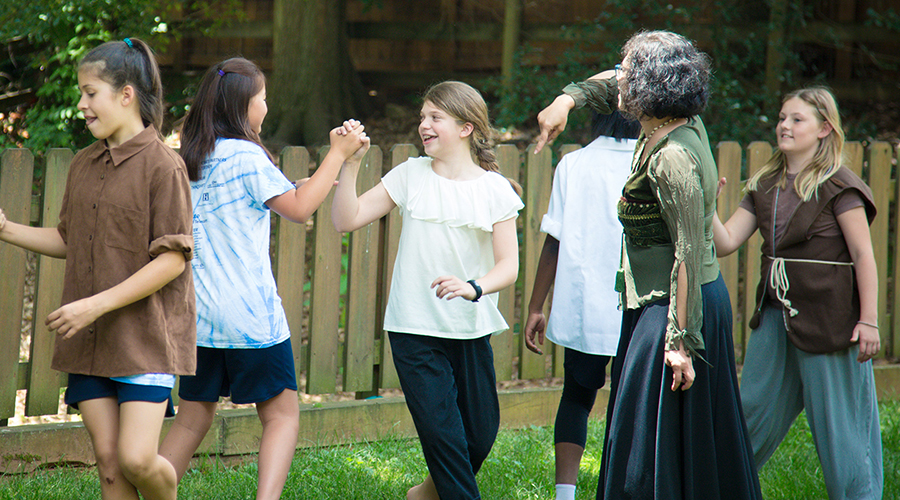
When I was in high school, the word "party" conjured up very specific imagery in my head. Such youthful parties were unfortunately defined by loud music, drinking of alcohol, and irresponsible behavior. Adults were mostly not present and the depths of immaturity seemed to find no limit. Yet, I admit there was something attractive to me about these social gatherings. There was a superficial but alluring culture of joy and celebration. As grateful as I was for various aspects of the Christian culture of my upbringing, the Christian church didn't present me with a robust and beautiful vision for parties.
As we approach a holiday like Christmas, we want to be thinking of how we are meeting the innate yearning in our children's hearts to celebrate. How can we be organizing and throwing parties so rich and fulfilling that our children would not even be attracted to the worldliness of the parties I describe above? We find in God's word that the appropriate response to the goodness of God includes feasting, dancing, music, and shouts of joy (Matthew 22:2, Psalm 149:3-4, Zephaniah 3:17, Psalm 95:2). Do these words define our celebrations as a Christian community? We will have two great opportunities to present this vision for celebration in the coming weeks as we approach Christmas and New Year's. Our children want to party. It is our job to nurture in them a healthy appetite for something more meaningful than what is offered by the world; a love for true, good, and beautiful celebrations.
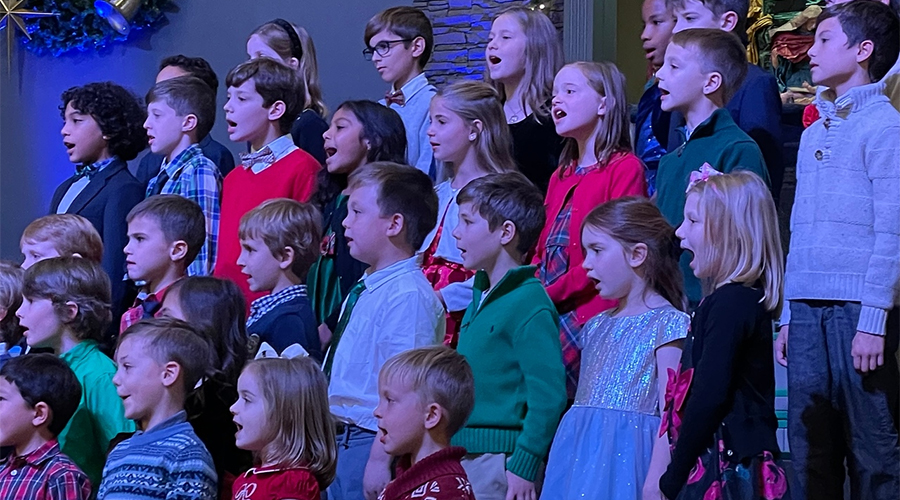
In 2001, psychologist Alexandra Lamont argued from her research that babies are able to remember music they listened to before they were born. In her experiment, mothers played a single piece of music (Mozart, Backstreet Boys, reggae or world beat) "repeatedly" during the final trimester of the pregnancy. One year later, having not heard the music for an entire year, they found that "children recognize and prefer music they were exposed to in the womb." In his book This Is Your Brain on Music , Daniel J. Levitin discusses this experiment to demonstrate the power of music on our memory. It is hard to deny that God has hard wired us to be formed and shaped by music. Levitin goes on to say, "young children start to show a preference for the music of their culture by age two... Researchers point to the teen years as the turning point for musical preferences. It is around the age of ten or eleven that most children take on music as a real interest... As adults, the music we tend to be nostalgic for, the music that feels like it is 'our' music, corresponds to the music we heard during these years... Most people have formed their tastes by the age of eighteen or twenty." The music we are exposing to our children in their young years will be more influential on them then the music they listen to in their 20's or 30's. Music has the power to form the affections of our children.
This Thursday, our children remember and celebrate the coming of Jesus with singing. Stonehaven loves to sing. We do it every day. We begin with singing during our morning meeting and end with singing just before afternoon dismissal. The foundational reason we ask this of our children at Stonehaven is to obey the Scriptures. "Let the word of Christ dwell in you richly, teaching and admonishing one another in all wisdom, singing psalms and hymns and spiritual songs, with thankfulness in your hearts to God" (Colossians 3:16). However, as God so often does, He brings abundant blessings through our obedience. We trust that as we expose our children to true, good, and beautiful music, it will form and shape their affections to follow and love the Lord.

For the utilitarian, the idea of a massive Thanksgiving meal is nonsensical. Several hours of preparation only to watch it devoured in an hour. A pile of dishes, overflowing garbage cans, and heavy stomachs. Why all the fuss for such a short pay off?
In her Circe article Reflections On Having Consumed in One Hour a Meal Prepared Over Two Days , Lindsey Brigham Knott answers this question, "From when we were little girls, my sisters and I loved the day before Thanksgiving almost more than the day itself, because we would spend nearly the whole of it in the kitchen with Mama, at first "helping," and later truly helping, her to cook the half-dozen beloved dishes, all from scratch, that appeared on the table only once each year. Through my mother's commitment to the disproportion of a Thanksgiving feast, we learned to know and love the particular togetherness of the kitchen and of shared labor. We also learned to relish our family's celebration not only in its culmination, but also in its preparation; that is, we learned that joy consists of anticipation as much as experience (and, also, memory). The startling figure communicated to us a vision of love's laboriousness, labor's sweetness, and joy's fullness."
What if the fuss became central to the holiday experience? Knott's mother trained her children to "relish" the time of preparation. As we continue through this holiday season, let us consider how we are organizing our family routines to help our children appreciate the value of anticipation and its attendant joys.
The Christian church has used Advent as a way to leverage anticipation during the Christmas season. Knott says, "Our cultural context presses us to prioritize the moment of satisfaction and to scorn the time of waiting. We celebrate Christmas without Advent and wish for instant Thanksgiving dinner. Yet, for myself, one of the greatest guards against this attitude has been the formation I received through my mother's holiday traditions." Do not scorn the time of waiting. The deepest joys of Christmas come when we have fully enjoyed the disproportionate and laborious season of Advent.
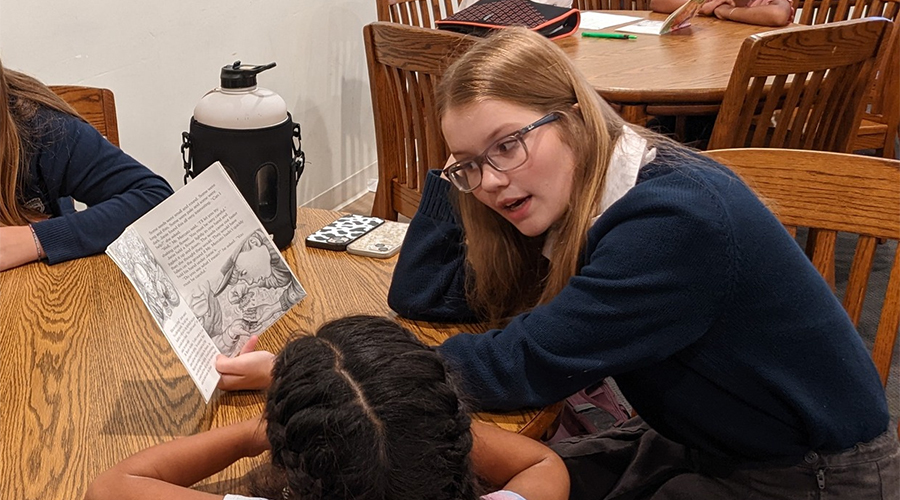
One of my personal struggles is the development and maintenance of daily routines and rhythms. I am easily distracted by the unexpected sunset or the spontaneous activity that can distract me from a particular responsibility. So, allow me to celebrate one of the few Edwards routines that has become a cherished family activity. Almost every evening, we make it a priority to carve out fifteen minutes to read aloud a children's book. The lively escapades of the Penderwick sisters is our current adventure. In a 2013 lecture, author Neil Gaiman doesn't merely recommend the value of reading aloud, he goes further saying, "We have an obligation to read aloud to our children. To read them things they enjoy. To read to them stories we are already tired of. To do the voices, to make it interesting, and not to stop reading to them just because they learn to read to themselves."
I can't recommend reading aloud to children enough. If a parent asked for a recommendation for how they could better connect with a child, I would propose they begin with reading aloud. I would especially challenge fathers to make time for this edifying experience. Dr. Seuss says, "You're never too old, too wacky, too wild, to pick up a book and read to a child." Often people will highlight the utilitarian benefits of reading aloud such as how it can contribute to a child's academic success or help their language skills. Maybe even argue its value for taking college entrance exams. For me, it provides an easy and accessible opportunity to love my children well by sharing a beautiful experience together. It is good for their souls and mine as well.
Below are ten of my favorite read-aloud books that I highly recommend:

There are a small number of routines that seem to only get better with time. Abbott and Costello's Who's on First comedy routine is at the top of my list. The sketch begins with Abbott telling Costello the peculiar names used by baseball players these days, "We have on our team Who's on first, What's on second, I Don't Know is on third." Costello responds, "That's what I want to find out; the guy's names." Abbott repeats, "I'm telling you. Who's on first, What's on second, I Don't Know is on third." In one rendition, the confusion over word meanings continues for a hilarious eight minutes as Abbott reveals some of the other player names like Why, Tomorrow, and I Don't Care.
This routine emphasizes the importance of a common language. For teaching to be effective, the teacher and learner must possess a common language. In his book The Seven Laws of Teaching , John Milton Gregory says, "No teaching is complete that does not issue in plain and intelligent expression of the truth taught... Words are tools under whose plastic touch the mind reduces the crude masses of its impressions into clear and valid propositions. Ideas become incarnate in words. They rise into visible forms in language, and stand ready to be studied and known, to be marshaled into the combinations and mechanism of intelligible thought." Stonehaven's philosophy of learning reveres the power of words and how important it is that teachers order them in a way that ensures our students can access and possess the truth being taught.
One of the most common violations of the law of the language according to Gregory is the teacher being deceived that the student has grasped the full meaning of what is being taught. He says, "The interested look and the smiling assent of the pupil cheat the teacher into the belief that his language is understood, and all the more easily because the pupil himself is deceived and says he understands, when, in fact, he has caught only a mere glimpse of the meaning." In my twenty years of teaching, I can heartily affirm the truth of this statement. Many a child has nodded their head expressing their understanding of a mathematical concept but then failed to replicate the process on their quiz or homework. Certainly one of the most often asked questions in the classroom is, "Do you understand?" I would argue this question is minimally helpful. Teachers and parents should be cautious to accept "Yes" as confirmation that the student has fully grasped the idea being taught. What is the better way to verify learning has occurred? The teacher must, "take care to secure from the child in return a clear statement of the truth."
How might this look in the home? When parents are asking their children to complete a list of chores, they will some times provide a list of their children to do x, y, and z. This could be followed with the question, "Do you understand?" What is the better way that parent make sure the child understands the expectations? The parent would ask the child to repeat back what the parent has requested of them. "Morris, please tell me what Daddy has asked you to do." The child is not released until they can articulate well all that is expected of them. As Gregory says, "Secure from him as full a statement as possible of knowledge of the subject."
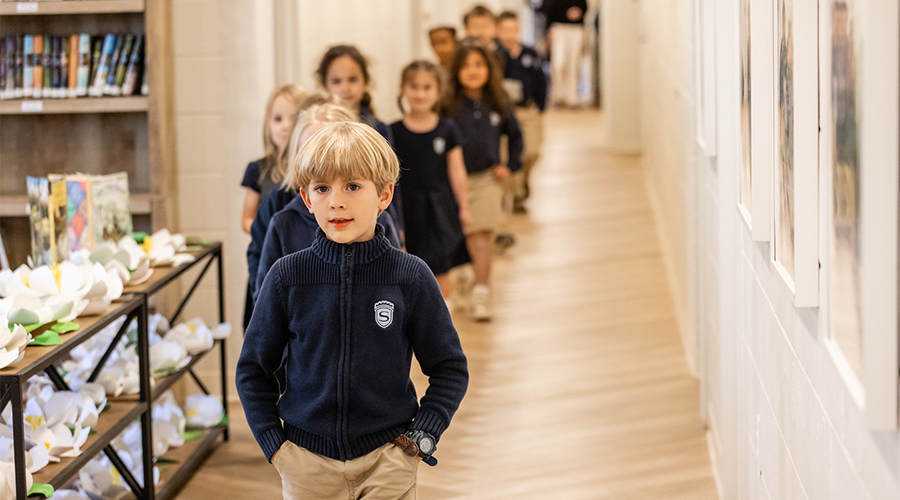
A healthy distinction that we often emphasize at Stonehaven is the difference between God's rules and "house" rules. God's rules are the ones we find clearly articulated in the Word of God. "Honor your father and mother" and "Do not steal" are rules established by God. They are neither relative or flexible. House rules are the rules that aren't explicitly stated in Scripture. At some point the boys at Stonehaven will realize that the Bible does not require that their, "hair must be short enough that the eyebrows, top of the collar, and bottom of the ear are always visible." The girls jump in and say, "Where does the Bible say that skirt length must be 3" above the knee or longer?"
In Christian schools, it is impossible to expect that our parents agree with every detail of our house rules. A school's dress code, holiday observance, behavioral expectations, and disciplinary consequences can rankle parents and students. How would Stonehaven ask our parents to respond when they struggle to agree with a particular house rule? First, please know we are happy to discuss such disagreements. Second, trust that we are implementing these rules with a greater good in mind. The goal of our dress code is to train virtues like decorum, orderliness, and respect. The goal of our disciplinary process is repentance, justice, and redemption. We believe that house rules are necessary to the development of our school's rich and robust culture. Pastor Henry Van Til said, "Culture is religion externalized and made explicit." Last, when convinced that we are off the mark, we'd ask our parents to consider if Proverbs 19:11 applies, "It is his glory to overlook an offense."
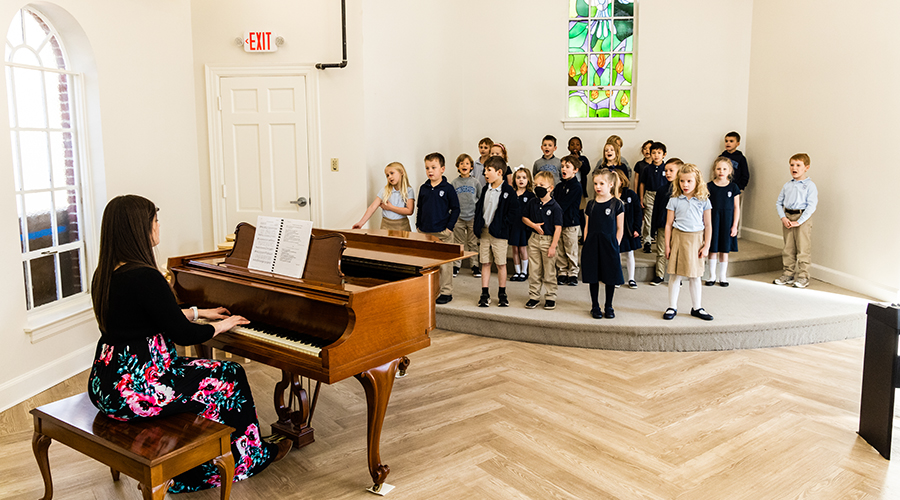
One of the more famous commercials of all time begins with a man wondering if there is anyone out there that still doesn't understand the dangers of drug abuse. For those still in the dark, he picks up an egg while saying, "This is your brain." He cracks the egg and empties it into a hot frying pan... "This is your brain on drugs. Any questions?" The visual was so creative and well executed that most people from my generation easily remember the commercial.
If drugs are one of the more damaging things to the brain, what activity could be most beneficial for our brains? Maybe reading, playing sudoku, running daily, playing chess, or eating omega fatty acids. Although all fine things, I think it would be hard to argue against the powerful and mysterious benefits that music can have on our brains. In Daniel Levitin's book This Is Your Brain on Music , he says, "The story of your brain on music is the story of an exquisite orchestration of brain regions, involving both the oldest and newest parts of the human brain, and regions as far apart as the cerebellum in the back of the head and the frontal lobes just behind your eyes. It involves precision choreography… between logical prediction systems and emotional reward systems... it reminds us of other music we have heard, and it activates memory traces of emotional times of our lives. Your brain on music is all about... connections."
Some schools might be pursuing excellence in music education with a primary focus on how it nourishes mental activity in our brain. At Stonehaven, we pursue it because it is true and beautiful. We should not be surprised that the pursuit of beauty is ultimately a healthy diet for our brains.
At the annual classical Christian school conference in June of 2021, I had the pleasure of attending some seminars by a music educator named Jarrod Richey. He challenged those in attendance to design and arrange the education in their schools in a manner that would encourage their students to not only become appreciators of music but more importantly become doers of music. He is helping lead a movement within classical Christian schools that desires to see music and singing become a core subject as important as English and mathematics. He argues that, "Music education must again come to mean doing music and not simply knowing about it." We are fortunate to have two gifted teachers in Megan Johnson and Natasha Myrick who share Mr. Richey's passion for singing and lead our school's music program. We continue to see the music program maturing and growing into an area of excellence for our school.
What can our parents do to partner with Stonehaven in our desire to make music central in the lives of our children? The most logical thing is to integrate the doing of music into the fabric of our homes. Levitin notes that for most of human history, music was not neatly divided into two categories; those who listen and those who do... "Only relatively recently in our own culture, five hundred years or so ago, did a distinction arise that cut society in two, forming separate classes of music performers and music listeners. Throughout most of the world and for most of human history, music making was as natural an activity as breathing and walking, and everyone participated. Concert halls, dedicated to the performance of music, arose only in the last several centuries."
It is time that Christian culture reimagines the role of music in our homes. Richey says, "Don't be content with simply their joy of music in its hearing. But do your best to see that they possess the ability to consciously create and recreate music to the glory of God as a resounding testament of this faithfulness from age to age." This is no small task. Where do we begin? With small, achievable steps. Find an easy piece of music that can be integrated into a family routine around breakfast, dinner, or bedtime. It could be singing the doxology or singing the songs that your children are learning at Stonehaven. As with most beautiful things, it will enrich the souls of your children and your own souls as well.
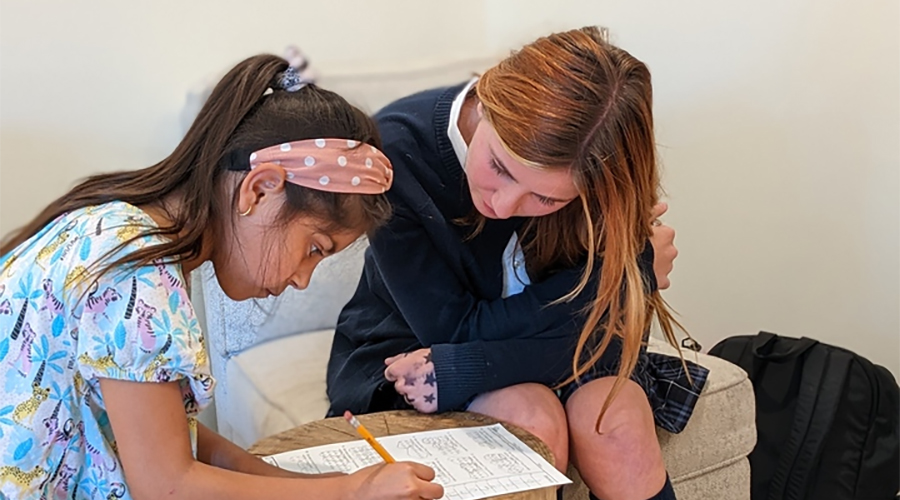
There is a Chinese saying that goes, "If you want happiness for an hour, take a nap. If you want happiness for a day, go fishing. If you want happiness for a year, inherit a fortune. If you want happiness for a lifetime, help somebody." We help and serve others because the Lord has commanded us to do so (John 12:26, Mark 10:45). Yet, what a blessing it is that through the act of serving others we can find such meaning and purpose. Ralph Waldo Emerson said, "It is one of the most beautiful compensations of life, that no man can sincerely try to help another without helping himself." We read in Acts 20:35, "In all things I have shown you that by working hard in this way we must help the weak and remember the words of the Lord Jesus, how he himself said, 'It is more blessed to give than to receive."
As we settle into the rhythms of this school year, I would like to take this opportunity to invite and encourage our parents to find small ways to serve our school. Come on a Friday to be a library reader, join one of our parent carpool teams, or reach out to your child's teacher to see how you might be able to help in some small way. Although our school appreciates all the help we can get, I would argue there are more significant benefits from serving our school. I see how much our students appreciate seeing their parents serving in the school. I'd also say that our souls need something that can only be attained through serving others; a confirmation of our purpose to live for something outside of ourselves.

Imagine an experiment where 400 fifth graders were given an IQ test consisting of a series of relatively simple puzzles that could be easily solved by most students. After successfully solving the puzzles, a single line of praise would be given to each student. They would be told either, "You must be smart at this," or "You must have worked really hard." The goal of this experiment, conducted by psychologist Carol Dweck, was to determine if students responded differently depending upon the nature of the praise they received.
Following the first test, the students were then given a choice. They could take a test that was more difficult than the first but they were told "that they'd learn a lot from attempting the puzzles," or they could take an easy test just like the first one. What they learned was that students praised for their effort (90% of them) were much more likely to choose the more challenging test. The students praised for their intelligence took the safer road towards success by choosing the easier test. As Dweck says, "the 'smart' kids took the cop-out."
It is common for parents, grandparents, teachers, and even children's coloring books to praise a child with reference to their innate intelligence... "You're so smart. What a smart cookie you are." In their book NurtureShock , Po Bronson and Ashley Merryman discuss Dweck's research and conclude that we should avoid praising our children for their intelligence, "When we praise children for their intelligence we tell them that this is the name of the game: look smart, don't risk making mistakes."
How then should we praise our children? Bronson and Merryman provide three sensible ideas for the type of praise that can truly motivate and inspire them to be better learners.
First, as argued above, she is proposing that we focus on the study habits that our children can control versus their innate characteristics like intelligence and beauty. The more we recognize them for their diligence, kindness, patience, and gratitude, the more they will focus on these virtues versus preserving their status as a smart or beautiful person.
Second, praise for our children must be sincere. Dweck says, "the biggest mistake parents make is assuming students aren't sophisticated enough to see and fell our true intentions." As our children mature, they are more capable of discerning if an action or behavior is truly praiseworthy. If we praise anything and everything, they will learn to disregard our praise. "Once children hear praise they interpret as meritless, they discount not just the insincere praise, but sincere praise as well."
Finally, praise is more effective when it is specific. Which of the following praises will have a greater impact on the future behavior of my son.
Both forms of praise are good but the second one more clearly reinforces the particular behavior of gratitude that we want him to continue. This requires parents and teachers to be vigilant and committed to seeing the specifics to be praised.
